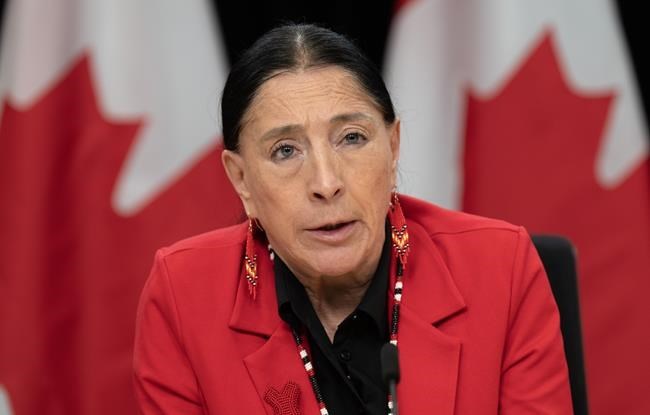OTTAWA — The interim national chief of the Assembly of First Nations is urging those eligible to receive compensation from a landmark class-action settlement to be careful that lawyers do not try to take advantage of them.
Interim national chief Joanna Bernard said she's heard about lawyers reaching out to eligible claimants to represent them after the Federal Court approved $23 billion in compensation for more than 300,000 First Nations children and their families over chronic underfunding of on-reserve child-welfare services.
Bernard said a system is in place to dole out monies, and claimants don't need costly representation from lawyers, who she warned could try to "take advantage of our people."
"That's not necessary," she said. "There is a process that (claimants) can do, and it will not cost them anything."
The settlement this week came more than 15 years after the Assembly of First Nations and the First Nations Child and Family Caring Society jointly launched a human-rights complaint that sparked a years-long legal battle with the federal government.
The 2007 human-rights complaint revolved around allegations that Ottawa's underfunding of on-reserve child-welfare services amounted to discrimination, and that First Nations children were denied equal access to support including school supplies and medical equipment.
The tribunal found in 2016 that First Nations were adversely affected by the services provided by the government and, in some cases, denied services as a result of the government's involvement.
"The panel acknowledges the suffering of those First Nations children and families who are or have been denied an equitable opportunity to remain together or to be reunited in a timely manner," the ruling said.
In 2019, the Canadian Human Rights Tribunal ordered Ottawa to pay $40,000 — the maximum penalty for discrimination — to each child inappropriately removed from their home beginning in 2006, as well as their parents or grandparents.
Child welfare was also among the central issues flagged in the 2015 final report of the Truth and Reconciliation Commission, which spent six years delving into the painful church-run, government-funded residential school system that operated from the 1870s to 1996.
The proposed settlement includes $23 billion in compensation for more than 300,000 children and their families, and another $20 billion to reform the child-welfare system.
Ottawa had offered to spend $20 billion to reform the child-welfare system and another $20 billion on compensation last year, but the tribunal rejected the proposal and raised concerns that not all eligible claimants would receive compensation.
Pressed about the delay on Thursday, Indigenous Services Minister Patty Hajdu said negotiations take time, and these are difficult conversations to have. She stressed that the federal government addressed the gaps.
"It was important for me to have the support of the prime minister in that work," she said.
"Every step of the way, we've been open to hearing from partners on how we could do better."
One class-action lawyer on the case, David Sterns, said the earliest date for claimants to receive compensation would be in mid- to late 2024, but that will only be for "a subset of the class."
He said that anyone who wants information about the distribution of payments and the claims process can find it at the fnchildclaims.ca website.
Those working to get compensation to families are also planning on using social media, email and "every possible channel" to reach eligible claimants, he said.
They'll be "beating the bushes" to try and find people who deserve compensation, he added.
He stressed nobody will be subjected to questioning and interrogation, as was the case with settlement processes related to residential schools and the Sixties Scoop.
The Federal Court resumed hearing final arguments related to the case on Thursday, including about legal fees that lawyers involved in the case are asking the government to cover.
That bill could be as high as $80 million.
Hajdu said Tuesday the federal government is appealing that cost to the courts and is negotiating "in good faith" with the lawyers to find a more "reasonable" number.
On Thursday, Sterns said the decision is under reserve and will be released "in due judgement."
This report by The Canadian Press was first published Oct. 26, 2023.
Alessia Passafiume, The Canadian Press



